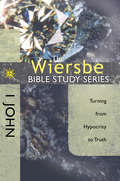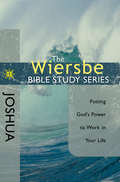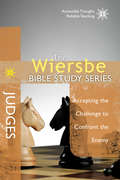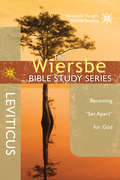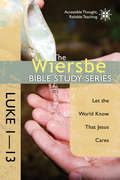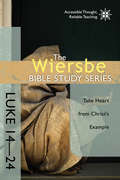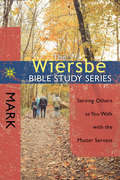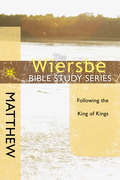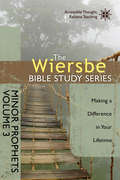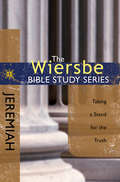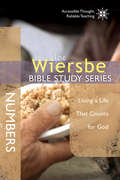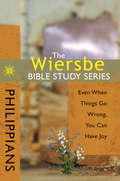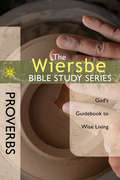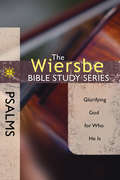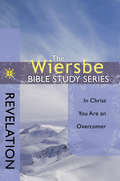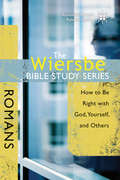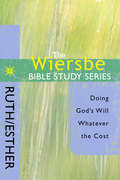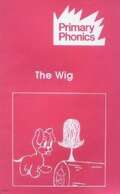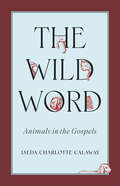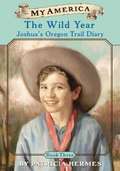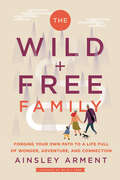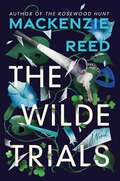- Table View
- List View
The Wiersbe Bible Study Series: John
by Warren W. WiersbeThe book of John lays the very foundation of the Gospel: Jesus Christ is the Son of God, and through Him we begin to truly live. This study takes an in-depth look at the life of Christ, from a miraculous public ministry that confirmed His calling [mission], to personal revelations that can transform the life of every believer. Rich in theology, and essential to evangelism, the book of John provides a definitive guide to Christ's powerful message of hope. The Wiersbe Bible Studies Series explores timeless wisdom found in God's word. Based on Dr. Warren W. Wiersbe's popular "BE" series, each study provides topical, relevant insights from selected books of the Bible. Designed for small groups, this eight-week study features selected commentaries from BE Alive and BE Transformed, engaging questions, and practical applications, all designed to help you connect God's word with your life.
The Wiersbe Bible Study Series: Joshua
by Warren W. WiersbeAfter 40 years of wandering in the desert, the Israelites have finally arrived at the Promised Land. Led by Moses' courageous successor, Joshua, the people soon discover that they must not only believe God's promise, but act on His word. The book of Joshua offers powerful parallels for believers today, encouraging us to stay strong in our faith, while standing firm on His promises to us.The Wiersbe Bible Study Series explores timeless wisdom found in God's Word. Based on Dr. Warren W. Wiersbe's popular "BE" series, each study provides topical, relevant insights from selected books of the Bible. Designed for small groups, this eight-week study features selected commentary from Be Strong, engaging questions, and practical applications, all designed to help you connect God's Word with your life.
The Wiersbe Bible Study Series: Judges
by Warren W. WiersbeAre you willing to be used for God's Glory? Just as we do today, people in biblical times lived in a time of turmoil when evil often triumphed over good. And that's when good people can make a great difference--in their nation and in the world. Following the time period from the death of Joshua to the rise of Saul, the book of Judges reminds us that God is looking for those who are ready to battle the enemy and see truth reign victorious. The Wiersbe Bible Study Series delivers practical, in-depth guides to selected books of the Bible. Featuring insights from Dr. Warren W. Wiersbe's Be Available commentary, this eight-week study includes engaging questions and practical applications that will help you connect God's Word with your life.
The Wiersbe Bible Study Series: Leviticus
by Warren W. WiersbeEight times in the Bible, God tells us, "Be holy, for I am holy!" What does this look like in our daily lives? How can we make holiness, not happiness, our chief pursuit? The book of Leviticus reminds us that God's admonition to be holy is an invitation to a life of close fellowship with Him. This study helps us understand what a difference it makes when we live a life set apart. The Wiersbe Bible Study Series delivers practical, in-depth guides to selected books of the Bible. Featuring insights from Dr. Warren W. Wiersbe's Be Holy commentary, this eight-week study includes engaging questions and practical applications that will help you connect God's Word with your life.
The Wiersbe Bible Study Series: Luke 1-13
by Warren W. WiersbeThe book of Luke offers rich insight into the heart of Christ. This Wiersbe Bible Study on Luke 1-13 chronicles the birth, early life, and compassionate ministry of Jesus.
The Wiersbe Bible Study Series: Luke 14-24
by Warren W. WiersbeThe Ultimate Profile in Courage Each of us has a calling to both joy and suffering as we seek to glorify God. In the second half of the book of Luke, we find in Jesus the perfect example of how to respond to that call with courage and hope. Chronicling Jesus's journey through opposition, betrayal, and the ultimate sacrifice on the cross, this study will strengthen and equip you to respond to God's call today. The Wiersbe Bible Study Series delivers practical, in-depth guides to selected books of the Bible. Featuring insights from Dr. Warren W. Wiersbe's Be Courageous commentary, this eight-week study includes engaging questions and practical applications that will help you connect God's Word with your life.
The Wiersbe Bible Study Series: Mark
by Warren W. WiersbeThe Gospel of Mark offers a unique look at the life of Christ and documents the ministry and miracles of Jesus that firmly established Him as God's Son. This insightful study takes an in-depth look at Christ's character and His remarkable messages, while exploring a savior whose life was marked by serving others. The Wiersbe Bible Studies Series explores timeless wisdom found in God's word. Based on Dr. Warren W. Wiersbe's popular "BE" series, each study provides topical, relevant insights from selected books of the Bible. Designed for small groups, this eight-week study features selected commentaries from BE Diligent, engaging questions, and practical applications, all designed to help you connect God's word with your life.
The Wiersbe Bible Study Series: Matthew
by Warren W. WiersbeMany Bible scholars believe that the book of Matthew is the most important document of the Christian faith. It connects the Old and New Testaments and introduces a king, the Lord Jesus, and His people, the church. The book of Matthew offers a unique look at the revolutionary life and words of Jesus, and shares His dynamic principles for becoming a faithful subject in the kingdom of God.The Wiersbe Bible Study Series explores timeless wisdom found in God's Word. Based on Dr. Warren W. Wiersbe's popular "BE" series, each study provides topical, relevant insights from selected books of the Bible. Ideal for both individuals and small groups, this ten-week study features excerpted commentary from Be Loyal, engaging questions, and practical applications, all designed to help you connect God's Word with your life.
The Wiersbe Bible Study Series: Minor Prophets Vol. 1
by Warren W. WiersbeThe twelve books of the Minor Prophets are anything but minor. Spanning 450 years, these writings offer a revealing look into the character, nature and heart of God. Based on six Minor Prophets--Hosea, Joel, Jonah, Nahum, Habakkuk, and Malachi--this study offers rich perspective on how God's plans and purposes intersect in the lives of His people. The Wiersbe Bible Studies Series explores timeless wisdom found in God's word. Based on Dr. Warren W. Wiersbe's popular "BE" series, each study provides topical, relevant insights from selected books of the Bible. Designed for small groups, this eight-week study features selected commentaries from BE Amazed, engaging questions, and practical applications, all designed to help you connect God's word with your life.
The Wiersbe Bible Study Series: Nehemiah
by Warren W. WiersbeThe life of Nehemiah is an inspiring testament to the power of determination. Years after Jerusalem's defeat by Babylon, the Jewish people returned to their land, only to discover a city left in ruins. Surrounded by enemies, Nehemiah finds himself tasked with an overwhelming charge: To rebuild the walls of his beloved city. This Bible study examines Nehemiah's remarkable journey from the everyday to the extraordinary, and explores the unique power found in perseverance. The Wiersbe Bible Studies Series explores timeless wisdom found in God's word. Based on Dr. Warren W. Wiersbe's popular "BE" series, each study provides topical, relevant insights from selected books of the Bible. Designed for small groups, this eight-week study features selected commentaries from BE Determined, engaging questions, and practical applications, all designed to help you connect God's word with your life.
The Wiersbe Bible Study Series: Numbers
by Warren W. WiersbePursue a Faith That Counts God's people were preparing to enter the Promised Land. Yet the book of Numbers holds a big statistic: While God longed for millions of Israelites to enter Canaan, only two people from an entire generation would arrive there. This study of Numbers explores how disobedience holds us back from God's best, and encourages us to pursue a life that counts. The Wiersbe Bible Study Series delivers practical, in-depth guides to selected books of the Bible. Featuring insights from Dr. Warren W. Wiersbe's Be Counted commentary, this eight-week study includes, engaging questions and practical applications that will help you connect God's Word with your life.
The Wiersbe Bible Study Series: Philippians
by Warren W. WiersbeUnlock the treasure of the "joy epistle," which pinpoints the joy-stealers in life and shows why you don't need to be anxious. Like us, the believers at Philippi needed to understand what it means to be joyful in Christ, no matter what the circumstances may be. However, God wants us to discover the secret of true joy and contentment by living in His will.Written in a personal, easy-to-understand style, join Dr. Warren Wiersbe, trusted pastor and respected Bible teacher, as he leads you on a journey to opening your mind and heart to the riches of God in the Wiersbe Bible Study Series.
The Wiersbe Bible Study Series: Proverbs
by Warren W. WiersbeLife is about choices. How should we lead our families? How should we manage our finances? How should we handle relationships? God's Word provides the answers. The book of Proverbs contains the greatest collection of wisdom ever recorded, written by one of the wisest men who ever lived. This study takes a fresh look at Proverbs and offers practical insights for making sound choices in every area of life.The Wiersbe Bible Study Series explores timeless wisdom found in God's Word. Based on Dr. Warren W. Wiersbe's popular "BE" seres, each study provides topical, relevant insights from selected books of the Bible. Designed for small groups, this ten-week study features excerpted commentary from Be Skillful, engaging questions, and practical applications, all designed to help you connect God's Word with your life.
The Wiersbe Bible Study Series: Psalms
by Warren W. WiersbeRediscover this powerful collection of praise, prayer, and worship Our God is extraordinary. A loving Savior. A caring Comforter. A tenderhearted Father. The One who has pursued our hearts at any cost. The book of Psalms celebrates the love story between creation and its Creator. It's a story that shares the remarkable attributes of God, and our joyous response to all that He is. This study guide explores the book of Psalms, a collection that continues to be the definitive devotional, prayer book, and hymnal for every believer. The Wiersbe Bible Studies Series explores timeless wisdom found in God's word. Based on Dr. Warren W. Wiersbe's popular "BE" series, each study provides topical, relevant insights from selected books of the Bible. Designed for small groups, this eight-week study features selected commentaries from BE Worshipful and BE Exultant!, engaging questions, and practical applications, all designed to help you connect God's word with your life.
The Wiersbe Bible Study Series: Revelation
by Warren W. WiersbeThe book of Revelation is one of the most intriguing books of the Bible. It's also one of the most mysterious. Filled with vivid imagery, rich themes, and deep spiritual insights, it can be challenging to read and understand. Yet woven throughout Revelation's sweeping tapestry is a unifying message: The victory found in Jesus Christ. This Bible study takes an in-depth, yet practical, look at the book of Revelation, and shares how we can experience a victorious life. The Wiersbe Bible Studies Series explores timeless wisdom found in God's word. Based on Dr. Warren W. Wiersbe's popular "BE" series, each study provides topical, relevant insights from selected books of the Bible. Designed for small groups, this eight-week study features selected commentaries from BE Victorious, engaging questions, and practical applications, all designed to help you connect God's word with your life.
The Wiersbe Bible Study Series: Romans
by Warren W. WiersbeNo book of the Bible more clearly illuminates the path of the Christian life than the book of Romans. Paul's power-packed letter stands as a treatise on our faith-tackling important topics of immense importance such as sin, justification, sanctification, and more.Take eight weeks to find out how the book of Romans can help you be right with God, yourself, and others. Trust beloved Bible teacher, Warren Wiersbe, to lead you or your small group on a chapter-by-chapter study that's both penetrating in its analysis and easy to understand.With select excerpts from his best-selling Be Right commentary on Romans and new, life-application questions, you and your small group can embark on a faith-deepening study on the doctrine and theology underpinning everything Christians hold dear.
The Wiersbe Bible Study Series: Ruth/Esther
by Warren W. WiersbeMary, Martha, Sarah, Eve. Of all the women in the Bible, only two have entire books devoted to telling their story-Ruth and Esther.What is it about these women that makes them different? What can we learn from their stories?Structured to be user-friendly to Christians of all ages, this new Bible study from trusted author Warren Wiersbe strikes the perfect balance of expositional commentary from the Scripture text and introspective questions for practical application. In eight weeks, you and your small group will have a strong understanding of these important biblical passages without feeling you've been overwhelmed by information overload.Study the lives of two women who boldly followed God's will, even when all seemed lost. Try this Bible study series for your next Sunday School class or Small Group and see how God wants to use your bold obedience to accomplish his plans.
The Wig (Primary Phonics Storybook #Set 1 Book 10)
by Barbara W. MakarA systematic, phonics-based early reading program that includes: the most practice for every skill, decodable readers for every skill, and reinforcement materials--help struggling students succeed in the regular classroom
The Wild Side of Photography
by Cyrill HarnischmacherGeared toward the adventurous photographer, The Wild Side of Photography provides a rich source of ideas and inspiration for fun projects ranging from clever to unconventional. Learn to build a shift/tilt lens for your DSLR from an old junkyard 120 film camera, try the camera toss, shoot images from a kite, use a peephole door viewer as a fisheye lens, or build your own pinhole camera. Get ready to capture the perfect aerial shot on your next commercial flight, and to paint beautiful night scenes using a flashlight as a lightbrush. Author/designer, Cyrill Harnischmacher, brought together 20 international authors and their unique projects to produce this intriguing book. Each project is presented with easy to understand instructional text, background info about the author and the project, and beautiful color images to illustrate what can be accomplished and how you can do it too. Topics include: - Laptop ministudio - Camera hacks - Pole monopods for aerial photography - Blur (motion blur, camera motion, out-of-focus) - Low budget astrophotography - Kite photography - Using the scanner as a camera - LittlePlanet views - Texture blending - Camera and lens building projects
The Wild Side: Angry Animals
by Henry Billings Melissa BillingsThe articles in this book spotlight the awesome powers of animals, powers that are unleashed when animals are angry or frightened or simply acting from instinct.
The Wild Side: Total Panic
by Henry Billings Melissa Billings Glencoe McGraw-Hill Staff Jamestown Publishers StaffThe Wild Side features amazing, strange, and unbelievable nonfiction selections that students will want to read. Each book includes new exercises and activities that improve reading comprehension and critical thinking skills.
The Wild Word: Animals in the Gospels
by Jaeda Charlotte CalawayPlaced in a manger as an infant, Jesus seems to have been born into a world teeming with animal life. Yet read the stories again. Does Mary ride a donkey? Does the centurion ride a horse? Animals are everywhere in the gospels, though not always in the ways we expect. Where animals are visible, their presence means more than we realize.The Wild Word explores the gospels’ well-known, forgotten, and missing portrayals of animals. Jaeda Calaway examines the many interactions between humans and other animals in these biblical texts, first considering forms of consumption, such as eating animals, wearing animal products, working animals, and sacrificing animals. She then turns to symbolic animality: how humans assign animal traits and archetypes to other humans, how divine and demonic powers intersect with wild and domestic animals, and what queer and trans readings of gospel animals can illuminate.Told and retold for two thousand years, the gospel stories are deeply imprinted on Western culture. The Wild Word reveals how many of their associations with animals, animality, and wildness remain with us today.
The Wild Year: Joshua's Oregon Trail Diary, Book Three (My America)
by Patricia HermesJoshua continues to chronicle the pioneering life as he and his family continue to grow and thrive out West in Oregon. Throughout these times of hardship and happiness, Joshua is always courageous and thoughtful.
The Wild and Free Family: Forging Your Own Path to a Life Full of Wonder, Adventure, and Connection (Wild and Free)
by Ainsley Arment"Ainsley Arment has emerged as one of the most prominent voices in [this] grass-roots community." — New York TimesAs parents, we dream of creating a magical childhood for our kids, yet it can be so easy to slip into autopilot. Ainsley Arment—a mother of five, founder of the thriving community Wild + Free, and bestselling author—is no stranger to the barrage of decisions, opportunities, and daily tasks that each day brings. But what Ainsley has discovered is that the magic of life isn’t found in the hustle and bustle of constant activity but in the intentional ordinary decisions of our days. And when we assume that a family has to look or act a certain way, we miss the opportunity to build a meaningful and fulfilling life together. Drawn from her family's stories and those shared by the Wild + Free community, The Wild + Free Family explores how to create a family culture that breaks the mold by seeking to connect with our children, unleash their gifts, pursue a shared vision together, and redeem generational brokenness, among so much more. Inside these pages are Ainsley’s words of encouragement, honesty, and wisdom, guiding all parents to create a home where families can forge their own path to love stronger, live more fully, and grow closer to each other.
The Wilde Trials
by Mackenzie ReedFrom the acclaimed author of The Rosewood Hunt comes a thrilling new mystery about a high-stakes competition packed with shocking twists, second chances, and deadly deceit, where allies—and enemies—are the people you’d least expect.Chloe Gatti will do whatever it takes to win her elite boarding school’s annual competition, the Wilde Trials. In the two weeks leading up to graduation from Wilde Academy, a dozen seniors are chosen to compete in a series of seven ultimate physical and mental tests, and the winner will take home over half a million dollars—money that Chloe needs to help her sick sister.But the competition is fierce and includes her brooding ex-boyfriend, Hayes Stratford, whose brother was the only student to die during the trials a few years ago. When someone starts blackmailing Chloe during the competition, she’s forced to strike a deal with Hayes—if he helps her discover who is sabotaging her, she’ll help him solve the mystery his brother left behind.Following clues from Hayes’s brother, the unlikely allies discover that something isn’t right about the Wilde Trials. With a life-changing prize looming over her head and her buried feelings for Hayes rising to the surface, Chloe will have to decide what’s really worth fighting for, and if the cost of competing outweighs the potential consequences, even if that includes ending up like Hayes’s brother—dead.Fans of Jessica Goodman and Maureen Johnson will love this dark academia thriller with a romantic twist!“An action-packed, fast-paced adventure with characters that crackled off the page. I had so much fun on this wild ride.” —Goldy Moldavsky, New York Times bestselling author of The Mary Shelley Club“Mackenzie Reed does it again! Action-packed and filled with heart, The Wilde Trials is a thrill ride from start to finish. With a jaw-dropping mystery and unexpected twists at every turn, this cutthroat academic competition keeps its Challengers—and readers—on their toes.” —Rachel Moore, author of Us in Ruins and The Library of Shadows"Atmospheric, pulse-pounding, and swoon-worthy, The Wilde Trials is perfect for readers who like their thrillers with a delicious side of dark academia. Full of riddles, hidden passageways, and a creepy, crumbling estate, Mackenzie Reed’s sophomore novel offers not only a high-stakes competition but also a thoughtful examination of ambition—and its sometimes deadly cost." —Olivia Worley, author of People to Follow and The Debutantes
